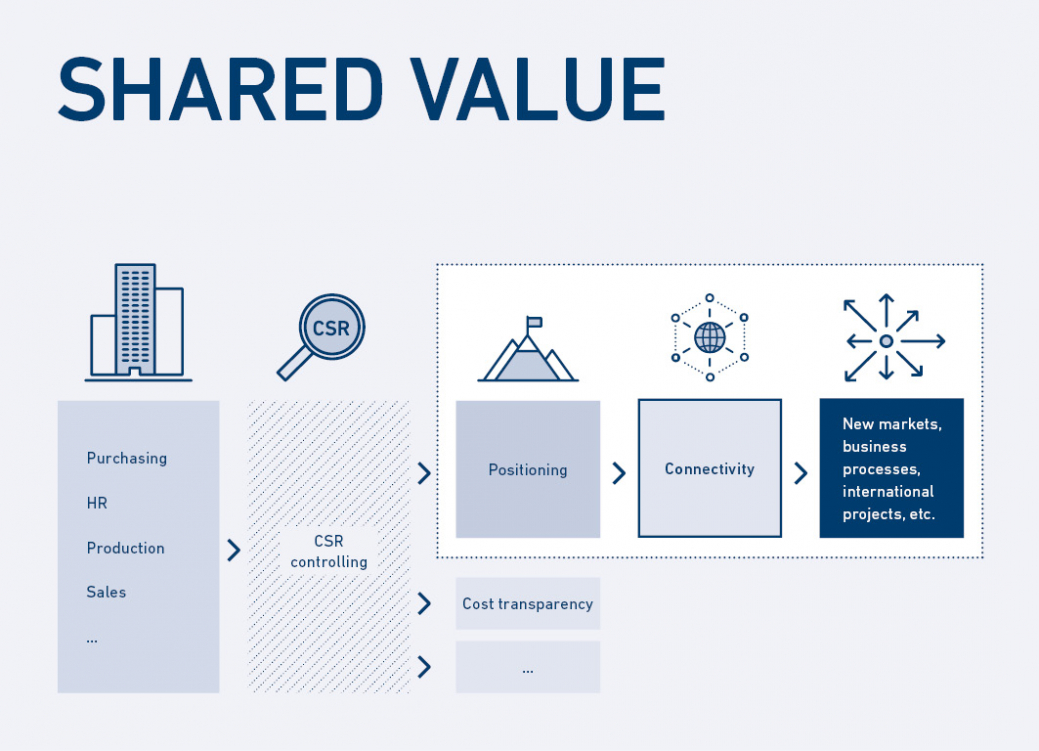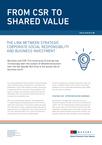
From CSR to shared value. The link between strategic corporate social responsibility and business investment
Business and CSR: This tense area of overlap has increasingly been the subject of detailed discussion over the last decade. But what is the actual role of business here?
By Dr Christoph Regierer and Kai M. Beckmann, Roever Broenner Susat Mazars
It is widely believed that the link between CSR and business means making company investments in accordance with established or future CSR standards. However, the process of integrating CSR into commercial thinking begins much earlier. It is about how companies make their profits and what effects their own commercial actions have, and not just about how companies invest.
CSR is not a philanthropic approach. The challenge lies in recognising the growing importance of CSR at an early stage and incorporating it into business models and guidelines. Making the virtually intangible tangible, defining and systematising it, and integrating it into company processes – for many companies today, this is still an inconvenience, something to work towards, yet indispensable!
As well as establishing a reliable framework for their own actions, companies need to remain aware of overriding guidelines, such as sustainable development goals (SDGs) and international standards.
Strategic CSR – opportunities for companies
The benefits of strategic CSR can be seen not just in enhanced reputation but also in the form of increased profitability. The risk of legal disputes and the associated cost falls; capital costs are influenced more and more by CSR. Stakeholder confidence grows; staff loyalty increases, and global procurement becomes more secure. However, this perspective does not seem plausible to many companies at first sight. What company records all of its cumulative CSR costs from purchasing, claims management, quality assurance, brand image or reputation and relates them to CSR goals?
When assessing key CSR issues, another factor plays an important role. It is essential to record as relevant risks those consequential commercial risks that directly result from the company’s own activities. These consequential risks, which are frequently associated with the supply chain, are usually not included as conventional corporate risks. The USA’s Dodd-Frank Act is aimed at precisely one such consequential risk, namely the financing of rebel groups in the Congo through “conflict minerals”. We should therefore broaden the extent to which we have looked at CSR risks up until now. Because once these consequential risks have been identified, the indicators to monitor them understood and the suitable control processes implemented, a benefit for the company in addition to risk prevention can often be identified: the company’s ability to be connected.
Connectivity is an increasingly important factor for success. It is about developing and executing international projects more and more via strategic alliances and partnerships, such as international alliances and funds that have been created in the area of international health policy. An example is the Global Alliance for Vaccines and Immunisation. It was launched with the goal of enabling every child to be vaccinated against the main infectious diseases; the alliance is supported by private foundations, international organisations (UNICEF, WHO, World Bank), governments, research facilities, companies and NGOs.
Being a member of a partnership like this provides access to new markets and potential business.However, membership is frequently dependent on compliance with high standards in transparency, authenticity and integrity. Often, a company can only see this new type of business potential if it has a comprehensive understanding of CSR, which includes the effects of its own actions, and this is also an important prerequisite for becoming a member.
Human rights as an example: Hurdles need to be overcome
The issue of “human rights” shows that companies still have a lot of potential for development in this regard. A survey by the Economist Intelligence Unit (EIU) found that 83 per cent of the company representatives questioned regard business as an important protagonist in the protection of human rights. At the same time, however, only a small number of study participants were able to explain how the protection of human rights is integrated along their own supply chain. The results show that, although the will exists, there are still hurdles to overcome in practice. The example also illustrates that the awareness companies have of their own supply chain is still too heavily focused on selected aspects, and potential opportunities – e.g., with regard to their connectivity – are insufficiently recorded and assessed.
Creating shared value
The more international a company is, the more complex and demanding a task it is to take into consideration the increasing regulatory and market-controlled CSR requirements. It is almost impossible to control these challenges centrally without a defined organisational framework. For the international SME sector, this development represents a particular challenge, as many of these companies, some of which are family-controlled, still assess their own CSR performance largely based on a traditional understanding of the values. This means that expectations in important foreign markets are often not taken into sufficient consideration.
We firmly believe that companies that integrate CSR systematically into their organisational structure and their actions are more productive and create added value. For many companies, this only requires one final step; without it, however, their awareness of CSR remains too restricted. The basis for this is an in-depth understanding of and engagement with employees, suppliers, specific cultural aspects, legislators and civil society. By comprehensively assessing this and relating it to their own actions, companies can provide themselves with a starting point for new business opportunities (connectivity). Companies, that incorporate this engagement as they make their profits, go above and beyond CSR and start to create shared value by bringing the interests of business into harmony with those of the communities surrounding them and the environment. We firmly believe that this is where the commercial future lies. The 2014/15 annual report of our international Mazars Group bears the title “Creating Shared Value”.
WP/RA/StB Dr Christoph Regierer, Managing Partner at Roever Broenner Susat Mazars
Kai Michael Beckmann, Director Compliance, Risk & Responsibility at Roever Broenner Susat Mazars


